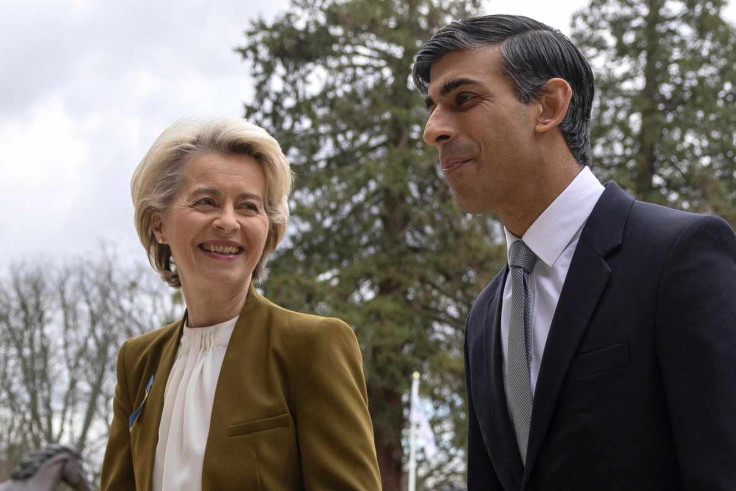Rishi Sunak 'Windsor Framework' did the impossible - but is it enough?
'Windsor Framework' marks a new chapter for UK-EU relations but DUP support remains uncertain.

Upon Boris Johnson's ascension to the role of Prime Minister, the Queen reportedly said to him: "I don't know why anyone would want the job".
Between balancing rebellious backbenchers, party memberships and an impossible-to-please general public, all while simultaneously protecting public services, keeping taxes down, cutting the deficit and investing in the economy - being Prime Minister is a notoriously difficult job.
But Rishi Sunak's task has been harder than most.
The issue of Northern Ireland has plagued UK politics since the Brexit vote of 2016 - and ultimately cost Theresa May her premiership.
Fears of fracturing hard-won peace following the turmoil of the decades-long troubles ensured a political consensus that considered a hard border between Northern Ireland and the Republic of Ireland as non-negotiable. Complicating things was an antithetical yet almost equally staunch determination to leave the single market.
Sunak's predecessor, Boris Johnson, sought to solve the conundrum with the 'Northern Ireland Protocol', which, in eschewing a hard border between Northern Ireland and the Republic instead, established a customs border in the Irish Sea - entailing that Northern Ireland would remain subject to the European Court of Justice (ECJ).
Unsurprisingly, Northern Irish Unionists responded with vociferous and unequivocal outrage. And a subsequent boycott from the Democratic Unionist Party (DUP) has left Northern Ireland without a devolved government since last February.
Boris Johnson's deal not only caused pandemonium in both Northern Ireland and Westminster, but his move in June 2022 to unilaterally override the treaty - to which the EU threatened legal action - inflamed the already-deteriorating relationship between the UK and EU.
What does Sunak's deal involve?
Sunak's 'Windsor Framework' establishes 2 lanes for the movement of goods across the Irish Sea: a 'green' lane for goods bound for Northern Ireland with almost no checks, and a 'red' lane for goods headed to the Republic requiring the full paperwork.
Northern Ireland will also no longer need to follow certain EU laws, including VAT and alcohol duties, and UK public health and safety standards will apply.
Some EU laws will still apply to Northern Ireland, but Sunak's deal establishes a mechanism - the "Stormont Break" - for the Northern Irish Assembly to oppose the introduction of new EU laws with a petition signed by at least 30 members of the legislative assembly (MLAs) from at least 2 parties which then triggers a longer process.
But how good is it?
Having inherited a distinctly formidable task, Sunak's 'Windsor Framework' has been warmly received - especially regarding UK-EU relations, with European Commission president Ursula von der Leyen referring to Sunak as her "Dear Rishi" during Monday's joint press conference.
Markets appeared modestly encouraged - sterling rose to over $1.21 on Tuesday afternoon after a 0.9% rise against the dollar in the hours following Monday's announcement.
However, Susannah Streeter, head of money and markets at Hargreaves Lansdown, thinks a closer relationship will not be enough to assuage the UK's economic problems.
Responding to Sunak and von der Leyen's press conference she said, "Dawn may be about to break on a new era of calmer relations between the UK and the European Union, but hopes still aren't racing away that it will herald a significant post-Brexit boost for the economy.
"Any deal would be a significant step forward, and this new consensual approach should help for other thorny political problems such as migration but in itself, it's unlikely to move the dial much for a big uplift to UK trade immediately."
Crucially, Sunak's deal has allowed the UK to swerve a potentially catastrophic UK-EU trade war. Given the UK's recent sluggish performance relative to other G7 nations - in January the International Monetary Fund (IMF) predicted a 0.6% decline for the UK economy over 2023 - the growing prospect of future trade deals with its largest trading partner is significant.
All, however, could be contingent on the deal making it past the DUP. Sir Jeffrey Donaldson, DUP leader, told BBC Radio 4's Today programme on Tuesday that "progress has been made, [but] we continue to have some concerns. We will examine the legal text... and come to a decision".
Further underscoring the fact that Sunak's deal has failed to meet their 'Seven Tests', in a DUP statement on Monday, Donaldson said, "There can be no disguising the fact that in some sectors of our economy, EU law remains applicable in Northern Ireland."
Notably, the Prime Minister hinted at the possibility of pushing the deal through parliament without DUP endorsement. When asked by BBC Radio 4's Today programme on Tuesday whether he would still enact the deal should they reject it he responded by saying, "The framework is what we have agreed with the European Union."
Sunak cannot compel the DUP into resuming power-sharing in Stormont. In a bid to entice the DUP into accepting the deal, Sunak wielded the prospect of significant American investment in Northern Ireland, describing American companies as "queueing up" to invest in the region.
Luke Ellis, Man City Chief Executive Officer, told Bloomberg TV on Tuesday that "if we never have to talk about Brexit again, the UK would be more investable". Sadly for Sunak - despite facing a herculean task and seemingly accomplishing a lot - that seems almost impossible.
© Copyright IBTimes 2025. All rights reserved.




















